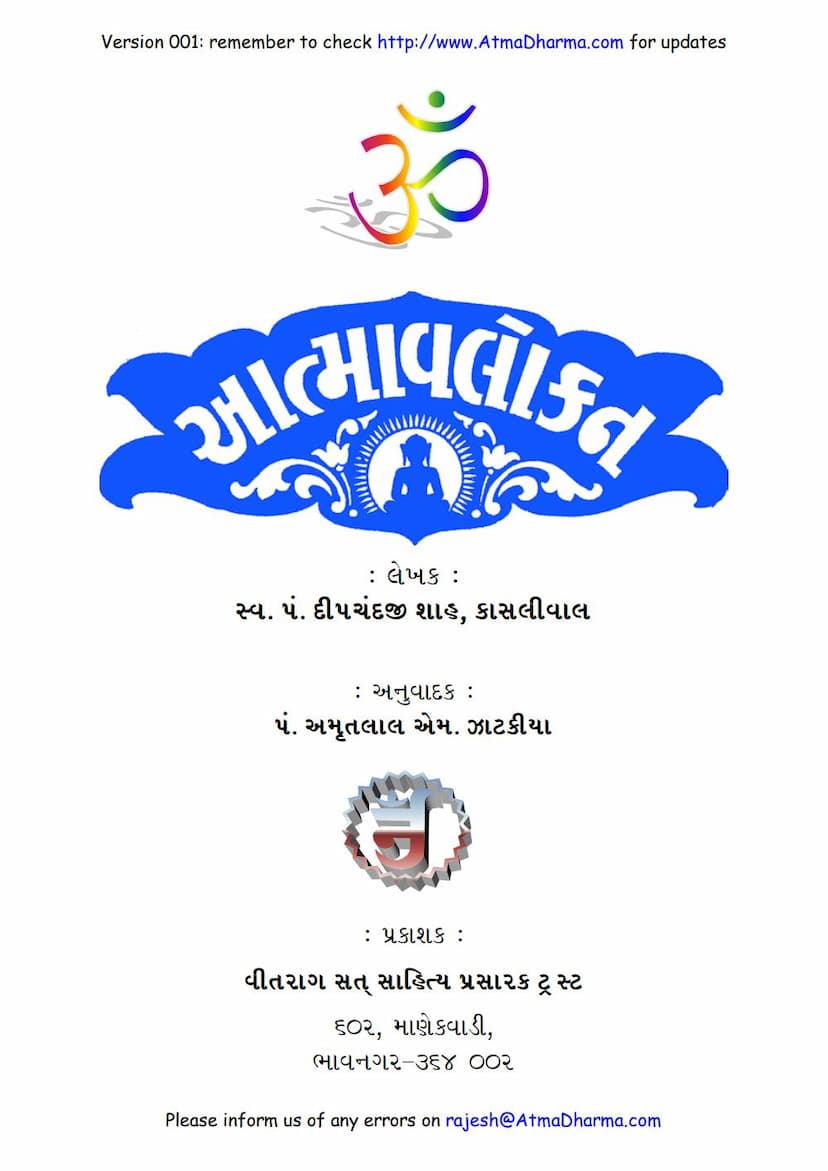Atma Avlokan
Added to library: September 1, 2025

Summary
"Atma Avlokan" (Self-Observation), authored by the esteemed spiritual scholar Pandit Deepchand Shah Kasliwal and translated into Gujarati by Pandit Amritlal M. Zhatakiya, published by Vitrag Sat Sahitya Prasar Trust, Bhavnagar, is a profound Jain text that guides seekers towards the realization of their true self. The book, originating from Jaipur, was made available to a wider audience through the efforts of the Jinendra Foundation in London.
The text emphasizes the Vitrag (passionless) state as the ultimate goal, asserting that attachment and aversion are not inherent to the soul's true nature. Through a meticulous dissection of Jain philosophical concepts, the book elaborates on various paths and principles that lead to self-realization.
Key themes and concepts covered in "Atma Avlokan" include:
- The True Nature of the Soul: The book posits that the soul is inherently pure, omniscient, and blissful, untainted by worldly passions. It explains how impurities like karma veil this true nature, leading to suffering.
- The Importance of Vitraagta (Passionlessness): A central theme is the cultivation of passionlessness, which is achieved by detaching from worldly desires, emotions, and external objects. This state is seen as crucial for spiritual progress.
- Understanding Devotion (Devalaya): The text clarifies that true devotion lies in recognizing and internalizing the qualities of the Vitraag Lords, who embody perfection and liberation. This internal recognition is more significant than external rituals or idol worship.
- The Role of the Guru: The book defines a true Guru as one who consistently guides towards the Vitraag state and embodies this principle in their own life. Such a Guru serves as a living example and a catalyst for the disciple's spiritual journey.
- The Path of Dharma: The author asserts that one's true religion is one's intrinsic nature, which is inherently Vitraag. Any deviation from this inherent purity is considered adharma (unrighteousness).
- Vidhivada (The Law of Causality/Right Action): This principle highlights the importance of aligning one's actions with the soul's true nature, leading to happiness and liberation. It contrasts this with actions that lead to suffering due to deviations from the self's inherent principles.
- Charitanuvad (The Narrative of Conduct): The text explores the consequences of actions, both righteous and unrighteous, emphasizing how they shape one's spiritual journey and karmic outcomes.
- Yathasthitivada (The Doctrine of Immutability): This concept underscores the eternal and unchanging nature of the soul's fundamental essence, which remains unaffected by external circumstances or karmic influences.
- Gneyavada (The Science of the Knowable): The book delves into the nature of what can be known, differentiating between the ephemeral and the eternal, guiding the seeker towards the realization of the knowable truth—the soul.
- Heyavyakhya (The Explanation of What to Renounce): "Atma Avlokan" clearly identifies transient worldly attachments, emotions, and karmic bonds as objects to be renounced for spiritual liberation.
- Upadayeswarupa Vyakhyana (The Explanation of What to Embrace): The text advocates for embracing the soul's true nature—its inherent purity, omniscience, and bliss—as the ultimate and worthy pursuit.
- Nishchaya and Vyavahara Naya (Ultimate and Conventional Truth): The book skillfully navigates the interplay between ultimate truth (Nishchaya Naya), which points to the soul's inherent nature, and conventional truth (Vyavahara Naya), which describes the empirical world and its functioning. It emphasizes understanding both to achieve a balanced spiritual perspective.
- The Stages of Spiritual Progress: The text meticulously outlines the path of spiritual development, touching upon various tattvas (principles) and gunasthanas (stages of spiritual evolution) as described in Jain scriptures. It discusses the concepts of karma, bondage, cessation, and liberation, illustrating how the soul's journey through these stages is driven by its own actions and intentions.
- Distinguishing True and False Paths: "Atma Avlokan" cautions against misinterpretations and false spiritual paths (Kunayaadhikar), emphasizing the need for correct understanding and practice based on the teachings of the Tirthankaras.
- The Nature of Actions: The book clarifies the concepts of Karma, Karta (doer), Karma (action), and Kriya (process), explaining that true action stems from the soul's inherent nature, unadulterated by external influences. It highlights that external actions are merely instruments, and the ultimate causality lies within the soul.
- The Process of Liberation: The text elaborates on how the soul, through unwavering self-observation and the eradication of karmic impurities, can attain liberation (Moksha). It describes the stages of Samvara (cessation of influx) and Nirjara (shedding of karma) as essential steps towards this ultimate goal.
- The Role of Pure Conduct: The book underscores the significance of pure conduct (Samya Bhav) in achieving self-realization. It explains how the refinement of one's actions and intentions, aligned with the soul's true nature, leads to spiritual purification.
- Self-Realization: The ultimate aim of "Atma Avlokan" is to guide the reader towards direct experience of the soul's true essence. This realization is described as a state of profound peace, bliss, and freedom from worldly suffering.
In essence, "Atma Avlokan" serves as a comprehensive spiritual guide, illuminating the path towards self-discovery and liberation through the principles of Jainism. It encourages diligent introspection and practice, promising the ultimate attainment of the soul's inherent divine nature.